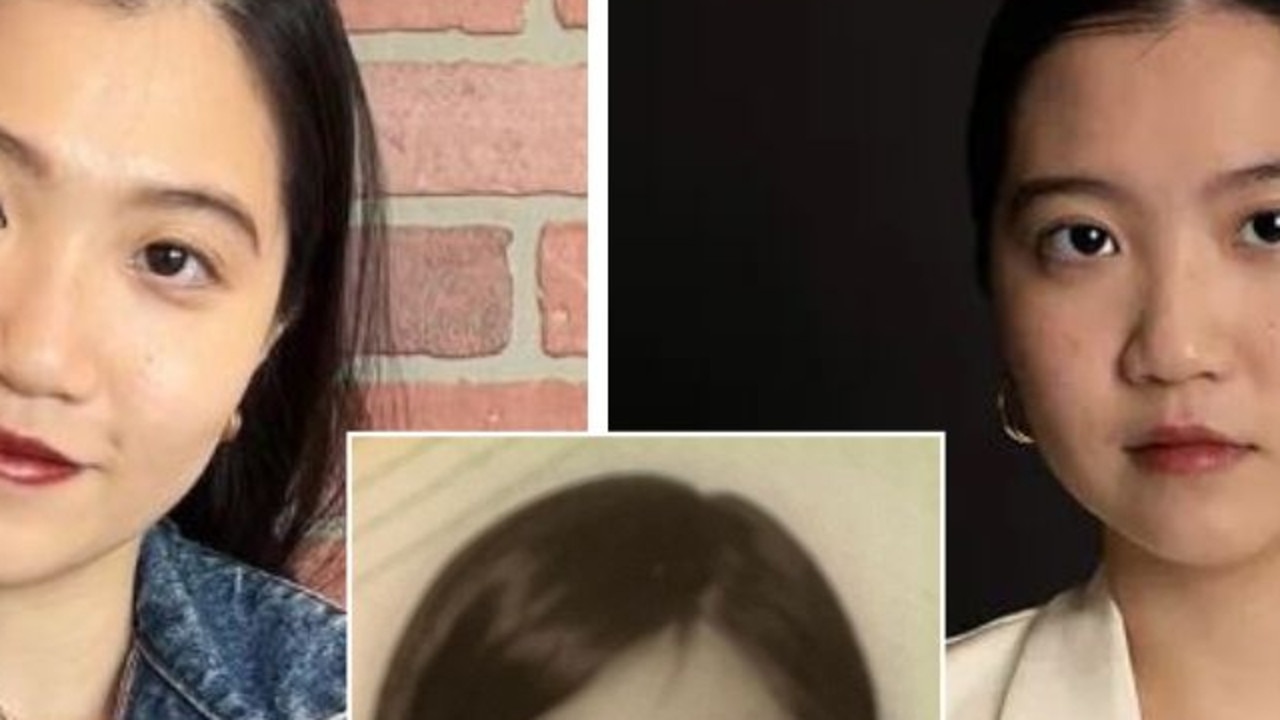[ad_1] This black and white identification of a woman has gone viral for a very dark reason. Anna Kwok was just 18 years old when this innocent-look
[ad_1]
This black and white identification of a woman has gone viral for a very dark reason.
Anna Kwok was just 18 years old when this innocent-looking snap was taken as she was renewing her Hong Kong Identity card almost a decade ago.
Now at 26, that picture has been plastered on news and social media sites all around the world for a reason she could never begin to imagine.
She has a bounty on her head.
Ms Kwok is in grave danger, with police offering a reward of $HKD1 million ($AUD193,000) for her capture and arrest.
Her crime?
Fighting for freedom and democracy in her home country of Hong Kong.
Currently living in exile in the United States, she has continued her fight from Washington DC, where she works as the executive director at the Hong Kong Democracy Council.
“For those who asked, yes, this is the photo I used to renew my HKID card when I was 18,” Ms Kwok wrote on her Twitter account earlier this week.
“The 18-year-old me would never have thought the photo would be publicised globally in an arrest warrant (with a bounty) 8 years later.”
Hong Kong’s leader called on eight overseas activists to turn themselves in on Tuesday, a day after police put out bounties on them for violating the city’s national security law.
The rewards are for any information leading to the arrests of eight prominent democracy activists – who are all based abroad – accusing them of crimes such as subversion and colluding with foreign forces.
City leader John Lee said he supported the police action and called on the activists to surrender themselves.
“The only way to end their destiny of being an abscondee who will be pursued for life is to surrender,” Lee told reporter, adding they would otherwise “spend their days in fear”.
All eight fled Hong Kong after Beijing imposed a sweeping national security law on the financial hub in 2020 to quell dissent after huge, sometimes violent pro-democracy protests in 2019 were quashed.
Lee called on the public to assist police and said even the activists’ relatives and friends could become informants.
The offer has been criticised by the United States, Britain and Australia, countries where the wanted activists reportedly reside.
US State Department spokesperson Matthew Miller condemned the bounties as part of China’s “transnational repression efforts” and called for their withdrawal.
“The extraterritorial application of the Beijing-imposed National Security Law is a dangerous precedent that threatens the human rights and fundamental freedoms of people all over the world,” he said.
Foreign Minister Penny Wong said the Australian government was “deeply disappointed” by the bounties.
“We have consistently expressed concerns about the broad application of the National Security Law to arrest or pressure pro-democracy figures and civil society,” Wong stated.
“Australia will steadfastly support freedom of expression.”
Britain will “not tolerate any attempts by China to intimidate and silence individuals in the UK and overseas”, UK Foreign Secretary James Cleverly said.
“The UK will always defend the universal right to freedom of expression and stand up for those who are targeted.”
The Chinese embassy in London said after Cleverly’s statement that Britain had interfered with China’s internal affairs by “openly (offering) protection for fugitives”.
“This is crude interference in Hong Kong’s rule of law and China’s internal affairs,” it said.
“China expresses strong dissatisfaction and firmly opposes this.”
Interpol said that no requests for “a Red Notice or Wanted Persons Diffusion” have been received for the eight activists, adding that the agency cannot compel any of its 195 member countries to arrest or extradite an individual.
Hong Kong’s national security law has led to the shutdown of scores of civil society groups, political parties and pro-democracy media outlets since it was enacted three years ago.
It has also weakened the firewall that once separated the city’s legal system from that of mainland China.
Police have arrested 260 people under the national security law so far, with 79 of them convicted or awaiting sentencing in Hong Kong.
While the law is meant to include people outside the city, officials have not specified how external enforcement is possible.
The eight wanted activists include former pro-democracy lawmakers Nathan Law, Ted Hui and Dennis Kwok.
Veteran unionist Mung Siu-tat is also among the wanted, along with activists Elmer Yuen, Finn Lau, Anna Kwok and Kevin Yam.
Ms Kwok urged US President Joe Biden to ban John Lee’s possible entry into the United States for the upcoming APEC meeting.
“I urge @POTUS to immediately give a strong & firm NO to sanctioned #HongKong CE John Lee’s possible entry into the U.S. for the APEC,” she wrote on Twitter.
“He’s the man who has put a $1M HKD bounty on my head. He’s the man who has orchestrated the far-reaching transnational repression.”
Ms Kwok told AFP the bounties may indirectly lead to threats against those on the wanted list.
“(The authorities) want pro-Beijing members of the general public to be driven by populism and to bring us inconveniences or even physical threats,” she said.
“I am not afraid. Actually, what they did makes me see even more clearly that what I have been doing is right.”
The other activists were equally defiant.
“I am just a Hong Konger who speaks out for Hong Kongers,” Law wrote on Twitter.
“We should not limit ourselves, self-censor, be intimidated, or live in fear.”
–With AFP
[ad_2]
Source link



COMMENTS